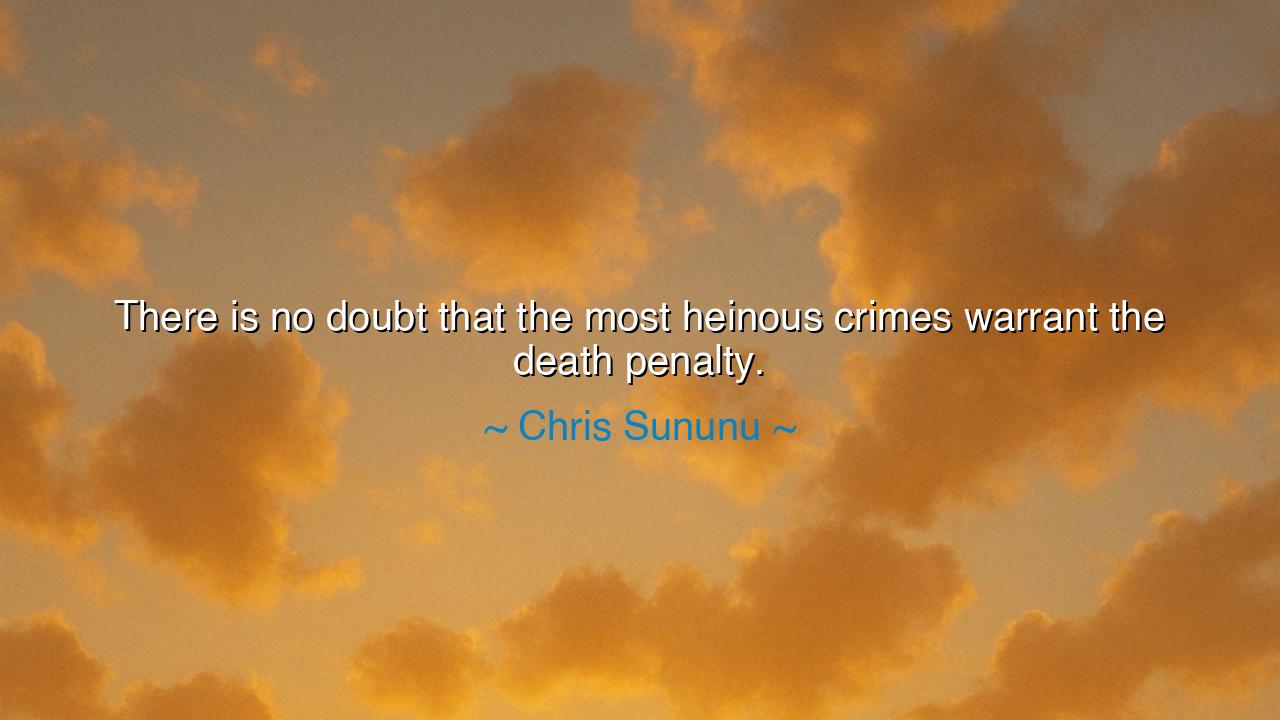
There is no doubt that the most heinous crimes warrant the death






“There is no doubt that the most heinous crimes warrant the death penalty.” Thus declared Chris Sununu, in the voice of a statesman wrestling with one of humanity’s oldest and gravest questions — how justice should answer evil. His words, sharp and resolute, echo through the centuries like a judgment pronounced from the high court of conscience. They awaken in us the ancient struggle between mercy and retribution, between the heart that forgives and the law that demands balance. For the death penalty, as Sununu invokes it, is not merely a punishment, but a symbol — a reckoning between humanity’s capacity for justice and its fear of vengeance.
To say that “the most heinous crimes warrant the death penalty” is to affirm that there are deeds so monstrous, so destructive to the sanctity of life and order, that they seem to cry out for the ultimate response. Such words do not come from cruelty, but from the solemn recognition of the sacredness of life itself. For it is precisely because life is holy that its deliberate violation demands the gravest consequence. The murderer, the tyrant, the one who rends innocence without remorse — these are they whom society deems beyond redemption, for their acts have shattered the moral order on which civilization stands. Thus, in Sununu’s declaration, there burns not hatred, but a fierce reverence for justice.
This belief is ancient. Long before the laws of nations, the codes of honor and divine decree spoke of retribution — “life for life,” “blood for blood.” In the Code of Hammurabi, carved into stone nearly four thousand years ago, the same principle appears, for the ancients saw justice not as revenge, but as restoration — a way to restore balance to a world thrown into chaos by wrongdoing. Likewise, in the scriptures and philosophies that shaped the ages, from the Mosaic law to Aristotle’s ethics, there is the conviction that evil must not be left unanswered, lest mercy decay into weakness and order dissolve into ruin.
And yet, even among the wise, there has always been doubt. For to wield the power of life and death is to walk upon sacred ground. The philosopher Socrates questioned whether any mortal could truly judge the soul of another. The prophets of old warned that vengeance belongs to the divine, not to man. Even in modern times, the executioner’s hand has trembled, for with each stroke of justice, humanity confronts its own reflection — the shadow of what it punishes. Thus, Sununu’s assertion, though confident, invites not comfort but contemplation. It is not the boast of certainty, but the burden of responsibility.
Consider the story of Nuremberg, where, after the Second World War, the architects of terror were brought to judgment. The world beheld men who had orchestrated the deaths of millions, who had turned cruelty into machinery and hatred into law. There, before the tribunal of nations, the question arose — what penalty could measure such evil? When the gallows were finally built, it was not from vengeance but from solemn necessity, a declaration to history that there are crimes so black that life itself, which they despised, must rise against them in justice. The world wept, yet it also exhaled — for justice, though terrible, had spoken.
In Chris Sununu’s words, then, we hear not only a political stance but a timeless echo — the voice of every generation that has faced the abyss of cruelty and asked what must be done. To say that heinous crimes warrant the death penalty is to assert that justice must be as strong as evil is bold. Yet the wisdom of the ancients teaches us that such power must be wielded with reverence, not rage. The death penalty, if it must exist, should never be an act of passion, but of duty; not the expression of hatred, but the solemn upholding of order. It must be as measured as the law, as rare as lightning, and as pure as truth.
Lesson: Justice, to be just, must never lose its humanity. The death penalty, though defended by many, carries the weight of eternity in its shadow. If you uphold it, do so not in anger but in sorrow. If you oppose it, do so not from weakness but from love of life. For the purpose of justice is not to destroy, but to restore balance — to protect the innocent, to honor the fallen, and to remind us all of the sacredness of existence.
So, remember the wisdom within Sununu’s conviction: that there are acts which tear at the fabric of the world, and that justice must stand firm against them. But also remember that in every act of judgment, the soul must bow to the divine. For the measure of a people is not only in how they punish the guilty, but in how they guard their own compassion while doing so. Let justice be tempered by mercy, and let the law, even when stern, remain humane. Only then can the hand that judges remain steady — and the heart that lives by justice remain pure.






AAdministratorAdministrator
Welcome, honored guests. Please leave a comment, we will respond soon